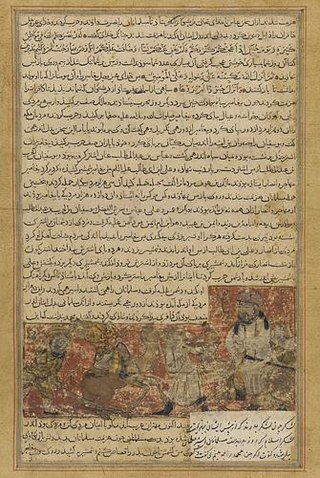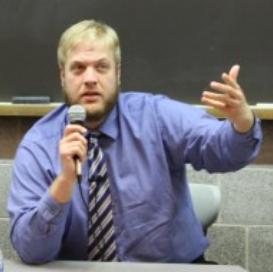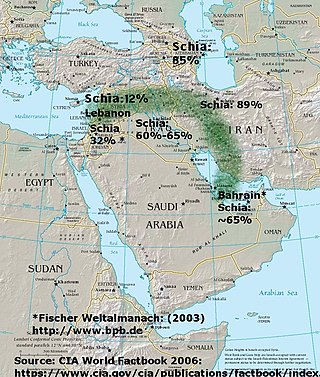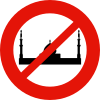
The Hijri calendar, also known in English as the Muslim calendar and Islamic calendar, is a lunar calendar consisting of 12 lunar months in a year of 354 or 355 days. It is used to determine the proper days of Islamic holidays and rituals, such as the annual fasting and the annual season for the great pilgrimage. In almost all countries where the predominant religion is Islam, the civil calendar is the Gregorian calendar, with Syriac month-names used in the Levant and Mesopotamia but the religious calendar is the Hijri one.

WSBN is a commercial AM sports radio station licensed to Washington, D.C., and serving the Washington metro area. It operates with 10,000 watts in the daytime and 2,700 watts at night using a directional antenna around the clock. WSBN's studios are on Jenifer Street in Northwest Washington. The transmitter is located off Black Rock Road in Germantown, Maryland.

Taj El-Din Hamid Hilaly was an Egyptian Australian imam of Lakemba Mosque in Sydney and a Sunni Muslim leader in Australia. The Australian Federation of Islamic Councils appointed him Mufti of Australia in 1988. He referred to himself as the Grand Mufti of Australia and New Zealand, although this title was not unanimously endorsed, and was also described by some Muslims as honorary, rather than substantial.
Tabarri is a doctrine that refers to the obligation of disassociation with those who oppose God and those who caused harm to and were the enemies of the Islamic prophet Muhammad.

Abū ʾl-Yaqẓān ʿAmmār ibn Yāsir ibn ʿĀmir ibn Mālik al-ʿAnsī al-Maḏḥiǧī also known as Abū ʾl-Yaqẓān ʿAmmār ibn Sumayya was one of the muhajirun in the history of Islam and, for his dedicated devotion to Islam's cause, is considered to be one of the closest and most loyal companions of Muhammad and to Muslims; thus, he occupies a position of the highest prominence in Islam.

The Battle of Hunayn was a conflict between the Muslims of the Islamic prophet Muhammad and the tribe of Qays in the aftermath of the conquest of Mecca. The battle took place in 8 AH in the Hunayn valley on the route from Mecca to Taif. The battle ultimately ended in a decisive victory for the Muslims, and it is one of the few battles mentioned by name in the Qur'an, where it appears in Surat at-Tawbah.
Aqidah is an Islamic term of Arabic origin that literally means "creed". It is also called Islamic creed or Islamic theology.

Abdul Rahman Ibn Abdul Aziz al-Sudais, better known as Al-Sudais, is one of the nine imams of the Grand Mosque, Masjid al-Haram in Makkah, Saudi Arabia; the president of the General Presidency for the Affairs of the Two Holy Mosques; a renowned Qāriʾ ; he was the Dubai International Holy Qur'an Award's "Islamic Personality Of the Year" in 2005.
Imam Abdul Alim Musa was a Muslim American activist. Musa is the founder and director of As-Sabiqun, and the Islamic Institute of Counter-Zionist American Psychological Warfare which has been identified as a hate group by the Southern Poverty Law Center.

Suhaib Webb is an American Muslim imam who converted from Christianity to Islam in 1992. He has previously been the imam of the Islamic Society of Boston Cultural Center (ISBCC).

Khalid Yasin is an American Islamic preacher, a former Christian, who lives in Manchester, England and lectures in the United Kingdom and other parts of the world. Yasin frequently travels overseas to spread his faith and has called himself a "media-bedouin," remarking that the Bedouins are willing to settle wherever there is "water and shelter".

Zafar Bangash is an Islamic movement journalist and commentator in Toronto, Canada. Bangash is Director of the Institute of Contemporary Islamic Thought (ICIT), and is former president of the Islamic Society of York Region, a suburb of Toronto. He also served as Imam at the Islamic Society of York Region's Mosque and community centre in Richmond Hill, Ontario. He relinquished his responsibilities with the Islamic Society of York Region in 2019 to devote full time to research in Seerah (life-history) for the Prophet of Islam. He is a former editor of Crescent International newsmagazine, and a Trustee and formerly assistant director of the Muslim Institute, London, where he worked with Dr. Kalim Siddiqui (1931–1996), the founder of the Muslim Institute and Leader of the Muslim Parliament of Great Britain. Bangash is also a co-founder of the Muslim Unity Group.

The Shia Crescent is the notionally crescent-shaped region of the Middle East where the majority population is Shia or where there is a strong Shia minority in the population.

The British debate over veils began in October 2006 when the MP and government minister Jack Straw wrote in his local newspaper, the Lancashire Evening Telegraph, that, while he did not want to be "prescriptive", he preferred talking to women who did not wear a niqab as he could see their face, and asked women who were wearing such items to remove them when they spoke to him, making clear that they could decline his request and that a female member of staff was in the room.
On November 20, 2006, 6:30 pm, six Muslim imams were removed from US Airways Flight 300 to Phoenix, Arizona, at Minneapolis-Saint Paul International Airport, because several passengers and crew members became alarmed by what they felt was suspicious behavior. The airline has stated that the captain delayed takeoff and called airport security workers to ask the imams to leave the plane; the men refused, and that the captain then called police. The plane left without the imams on board about three hours later. The imams were arrested, questioned, and then released.
Afternoon Records is a record label based in Minneapolis, Minnesota. The label was founded by Ian Anderson and Michael M. Sandstedt in 2003, the year Anderson graduated from high school. He wanted to create a platform for his high school band Aneuretical and others. Afternoon Records is distributed by Warner Music Group.
Khalid Latif is the Executive Director and Chaplain (Imam) for the Islamic Center at New York University (NYU).

The Obama Identity: A Novel is a 2010 novel written by Edward Klein and former Republican United States Representative John LeBoutillier. Among other things, the book explores and promotes the Barack Obama citizenship conspiracy theories and Barack Obama religion conspiracy theories in the form of a novel. In an interview on Fox & Friends, Leboutillier claimed that the book uses "real things" and has "so much real stuff". Following the interview, Media Matters for America published excerpts from the book in an article which criticized the book as having an "incomprehensible plot".
Shia Islam originated as a response to questions of Islamic religious leadership which became manifest as early as the death of Muhammad in 632 CE. The issues involved not only whom to appoint as the successor to Muhammad, but also what attributes a true successor should have. Sunnis regarded Caliphs as a temporal leaders,. To the Shiite, however, the question of succession is a matter of designation of an individual (Ali) through divine command. In the same way, Shias believed that each Imam designated the next Imam by the leave of God. So within Shia Islam it makes no difference to the Imam's position whether he is chosen as a Caliph or not.
Allah as a Lunar deity refers to the postulation that "Allah" originated as a moon god. The claim first arose in 1901 in the scholarship of archeologist Hugo Winckler, who identified the name Allah with a pre-Islamic Arabian deity known as Lah or Hubal, which he called a lunar deity. The idea has been dismissed by scholars such as Patricia Crone and Joseph Lumbard, and is vehemently rejected by Muslims.












